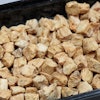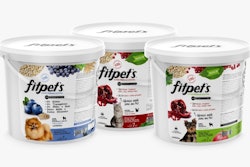
After the 2018 Farm Bill removed most hemp products from the Controlled Substances Act, hemp-based consumables proliferated for dogs, cats and other pets. While hulled hemp seed, hemp seed protein powder and hemp seed oil are Generally Recognized as Safe (GRAS) and are allowed for use in human food, University of Illinois at Urbana-Champaign scientists saw a scarcity of research on hemp in companion animal diets.
“Hemp products have become popular in the human food and health industry over the past few years,” the animal science researchers wrote in the Journal of Animal Science. “Due to this, a growing interest in using hemp ingredients in animal products has developed as well. There is a need to investigate the nutritional properties and potential utility of hemp seeds in food products for companion animals in order for them to be consumed safely and effectively. Four different varieties of hemp seed were evaluated and found to have similar fat, fiber, and protein content as well as protein quality. The results indicate that hemp seeds may be an advantageous ingredient in the development of pet food products, but a more in-depth evaluation using pet species is necessary to confirm this.”
Study of hemp seeds as pet food ingredients
While all four hemp seed varieties performed equally well, scientists may need to run feeding trials with actual dogs. Instead of canines, the University of Illinois team used birds to study the protein quality and true metabolizable energy of hemp-based pet food ingredients. The group used roosters who had received a surgical procedure, like a human appendectomy, to remove their cecum. This precision-fed cecectomized rooster serves as an effective, efficient model for dogs’ and cats’ digestive systems.
The hemp seeds came from the NWG 452, NWG 331, NWG 2730, X-59 varieties. All of the seeds had similar macronutrient composition. The seed varieties showed small variations in acid hydrolyzed fat, crude protein, total dietary fiber and gross energy content, as well as amino acid and long-chain fatty acid profiles. The ratio of omega-6 to omega-3 fatty acids was favorable at close to 3.5:1. Except for tryptophan, all essential amino acids concentrations exceeded NRC recommended allowances for adult dogs and cats.
Due to the limiting amount of tryptophan, the researchers concluded that hemp seeds alone do not meet all the amino acid requirements for adult dogs and cats. Hemp seeds would need a complimentary protein source.
“The data from this study suggest that hemp seeds may provide a beneficial source of fat, protein, and dietary fiber, with consideration to differences in nutrient profile among seed varieties,” the University of Illinois scientists wrote.

















